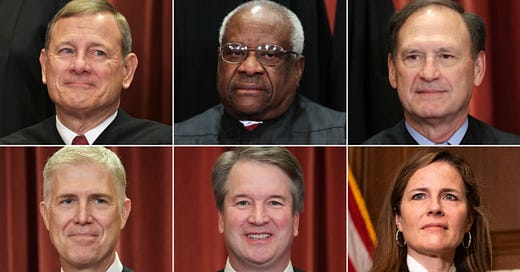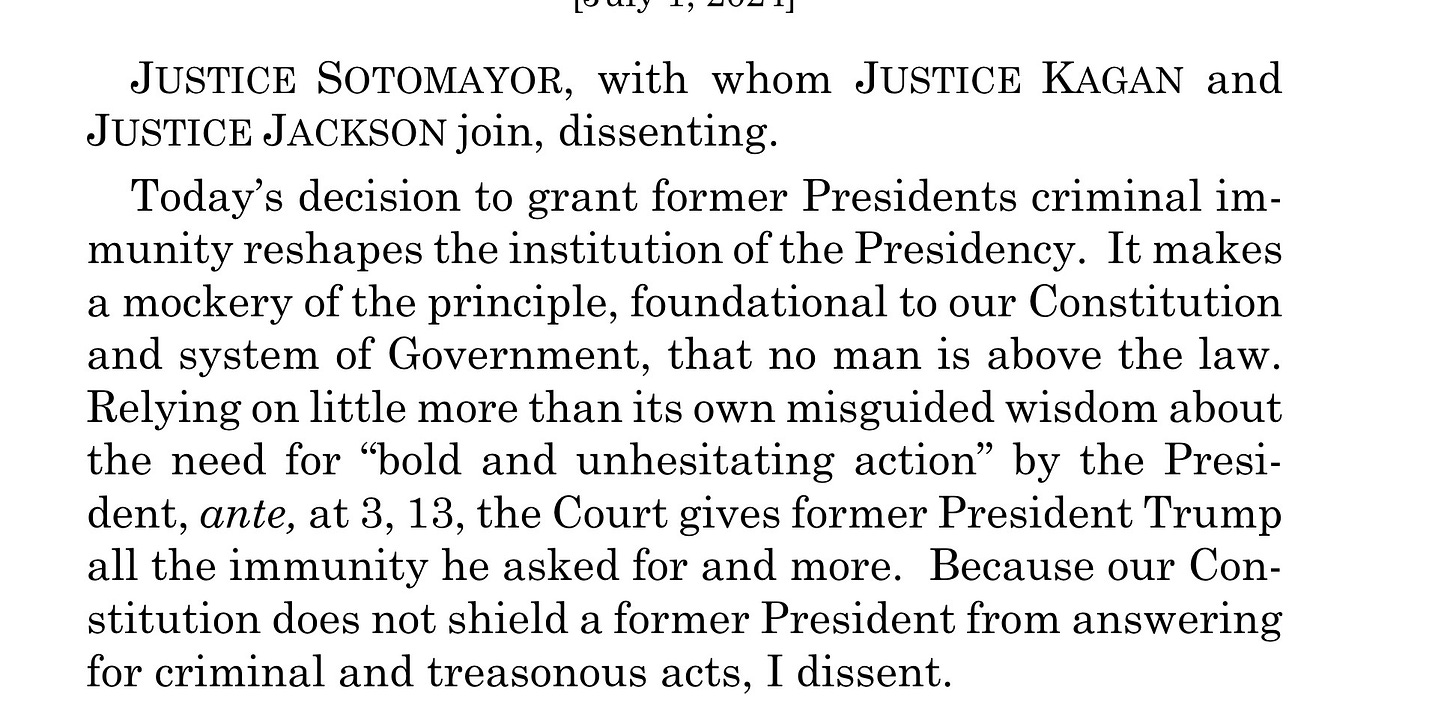Thomas Jefferson wrote something that perfectly describes what happened yesterday when the Supreme Court of the United States ruled in a 6-3 party line majority.
“To consider judges as the ultimate arbiters of all constitutional questions is a very dangerous doctrine indeed, and one which would place us under the despotism of an oligarchy.”
For many years too many of us presumed that regardless of its ideological predilections that the U.S. Supreme Court would attempt to preserve the rule of law, even if in other rulings it erred. In yesterday’s ruling the majority with Chief Justice John Roberts writing for a majority, of which two men Justices Alito and Thomas had conflicts of interests which in normal times ensured their recusal, and three, justices Kavanaugh, Gorsuch, and Corey-Barrett were nominated to Court by the man who brought the challenge, former President Donald Trump.
Trump’s lawyers had argued that he could not be prosecuted because he was acting in his official capacity as President and that as such he had immunity from criminal charges, even if he ordered SEAL Team 6 to assassinate a domestic political rival or opponent. Instead of dismissing the case out of hand the Court sat on the case for six months before delivering its opinion on the case. It then sent the case back to Judge Chutkan to determine if Trump’s actions to the enlist the Acting Attorney General and the Justice Department was in his official capacity.
They wrote that a President’s official duties extend absolute immunity to the “outer perimeter” of his official responsibilities. That immunity extends to anything that isn’t “manifestly or palpably beyond” this authority.
Likewise, the decision concluded that to distinguish official from unofficial conduct, courts “may not inquire into the President’s motives.” Motive is always a consideration in criminal cases of all kinds. Anyone who has a slight grasp of criminal prosecution understands that three factors are considered: means, motive, and opportunity. Motive is a key element in proving any criminal case, but the Supreme Court removed that from any consideration in prosecuting a President, in this case, former President Trump.
Chief Justice Roberts gave Judge Chutkan guidance on how she should proceed. Robert’s wrote:
We offer guidance on those issues below. Certain allegations such as those involving Trump's discussions with the Acting Attorney General-are readily categorized in light of the nature of the President's official relationship to the office held by that individual. Other allegations-such as those involving Trump's interactions with the Vice President, state officials, and certain private parties, and his comments to the general public-present more difficult questions. Although we identify several considerations pertinent to classifying those allegations and determining whether they are subject to immunity, that analysis ultimately is best left to the lower courts to perform in the first instance.
There are numerous other instances in the opinion that deserve scrutiny, but I do not have time to explain each here. I recommend that you read the analysis provided by former Federal Prosecutor and law professor Joyce Vance which is here:
But to wrap this part of my article up I want to echo others and say that the Court’s ruling has put any future President above the rule of all despite the attempts of Roberts to minimize the potential impact of his written opinion. Justice Sotomayer:
Justice Roberts did something almost never seen and castigated the dissenting Justices accusing them of “a tone of chilling doom that is wholly disproportionate to what the Court actually does today.”
He dismissed the dissent in these words:
“Unable to muster any meaningful textual or historical support, the principal dissent suggests that there is an ‘established understanding’ that ‘former Presidents are answerable to the criminal law for their official acts.’ Conspicuously absent is mention of the fact that since the founding, no President has ever faced criminal charges—let alone for his conduct in office. And accordingly no court has ever been faced with the question of a President’s immunity from prosecution. All that our Nation’s practice establishes on the subject is silence.”
Unfortunately, Roberts is silent on the fact that no President has ever been charged or prosecuted for such crimes, thus there is no legal precedent or opinion by which to criticize the dissenters.
The Roberts Court has effectively ruled that no President can be prosecuted for any crimes as long as it might be argued that he or she was engaged in their core constitutional duties. Unfortunately, their opinion basically absolved Trump and kicked the case back to Judge Chutkan with significant restrictions on what she could address in any ruling, which has to be returned to the Supreme Court for review, a court that has already ruled that Trump cannot be prosecuted for supposed official actions and his motives cannot be challenged.
The Roberts Court has overturned the rule of law in regards to the actions of a President by effectively placing him above the rule of law.
With this ruling the Court has established that Trump cannot be prosecuted for crimes that he has already committed, convicted or indicted on, or any he might commit if elected to office again. The dangers of this ruling are obvious. The 1934 the German courts submitted themselves to the principle of Gleichschalung, or coordination of the Nazi State. Because on a few occasions they broke from the party line they were sidelined when Hitler created a new court system outside normal jurisprudence in regard to people that the Nazis called the Volksgericht or the People’s Court. Under Judge Roland Freisler it sent many Germans to their deaths in show trials designed to humiliate them before unceremoniously killing them. However, the judges of the regular courts who cooperated with the Nazis in their crimes dis not escape. Some were tried in the Judges Trial, which was a part of the continuing trials at Nuremberg. In his opening remarks in that trial, General Telford Taylor said:
“This case is unusual in that the defendants are charged with crimes committed in the name of the law. These men, together with their deceased or fugitive colleagues, were the embodiment of what passed for justice in the Third Reich.”
The great film Judgement at Nuremberg dealt with a fictional version of that trial. In it, Spencer Tracy who played the role of the judge who judged the Nazi judges pronounced a sentence that is remarkable in its clarity. Since the film came towards the end of the Red Scare and the show proceedings of Senator Joe McCarthy who is idolized by many conservatives and Trump supporters.
If only our Supreme Court had the same moral and legal compass as that of Telford Taylor and the fictional Dan Haygood.
I expect that following this ruling that American courts up to the Supreme Court will commit crimes in the name of the law. Likewise, I expect that since many lower courts will not comply with this judicial fait accompli that if elected, Trump will establish his own version of the Nazis People’s Court to bypass them. It would not be the first time in American history that such a thing occurred. One component of the Fugitive Slave Act of 1850 as the creation of special magistrates to help return any Black person accused of being an escaped slave to slavery in the South without any evidence other than the slave owner or his representative’s word. This put the process outside of the Federal Court system which was judged to be to lenient in cases related to accused former slaves.
The only chance for America’s great experiment to survive is for Donald Trump to be defeated by whoever the Democrat candidate might be, is for the Democrat to win and hopefully be able to appoint two new justices in place of the older GOP partisans. I don’t want them to be Democrat partisans, just men and women committed to the rule of law, something that the conservative majority is incapable of doing.
Jefferson was correct. To trust judges to be the ultimate arbitrators of the Constitution is to place us under the despotic rule of an oligarchy. We must fight to make sure that it doesn’t happen. If we don’t, we are sure to lose all.
British Historian Laurence Rees wrote:
“human behavior is fragile and unpredictable and often at the mercy of the situation. Every individual still, of course, has a choice as to how to behave, it’s just that for many people the situation is the key determinate in that choice.”
What will we do?






